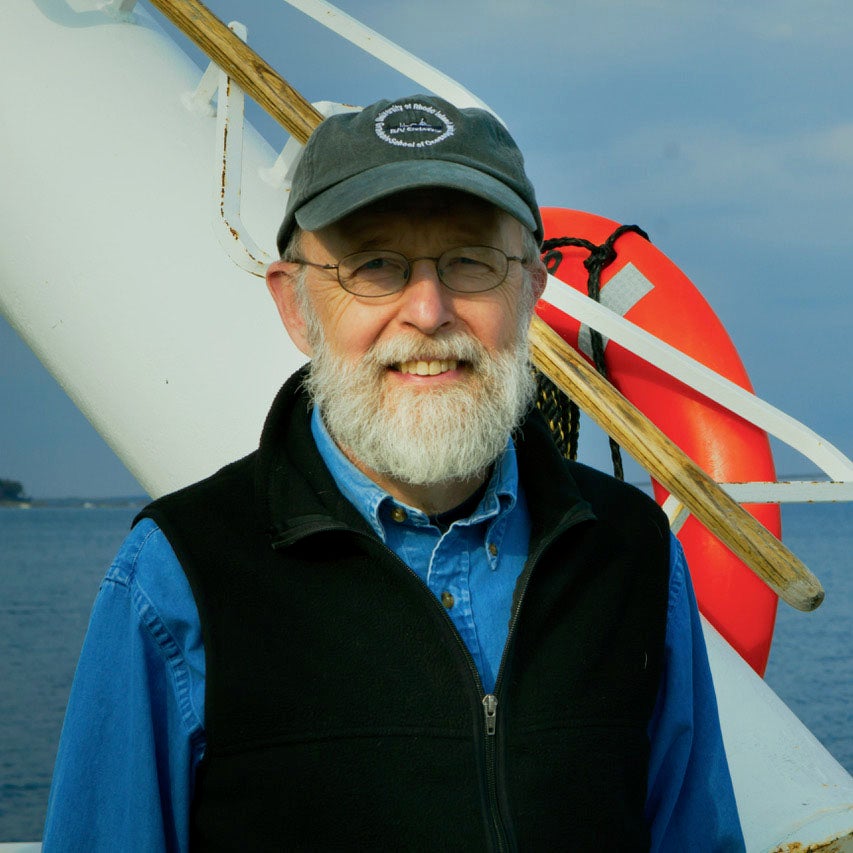- Emeritus Dean & Professor of Oceanography
- Phone: 401.874.6222
- Email: bcorliss@uri.edu
Biography
Dr. Bruce H. Corliss, former dean of the Graduate School of Oceanography, grew up far from the Atlantic Ocean but that did not deter him from pursuing a distinguished career in oceanography.
A native of Vermont, Corliss studied geology at the University of Vermont—the ocean was nearly a day’s drive distant but he had a backyard body of water—the picturesque Lake Champlain, which divides much of Vermont from upper New York State.
“I worked in the geology department doing Lake Champlain research for three summers. That’s how it got started. I was intrigued by that and wanted to go into oceanography,” he recalls.
Corliss came to GSO in 1971 and at first studied geological oceanography. After meeting and chatting with GSO faculty mentors he started to focus on paleoceanography and microfossils.
After finishing his doctorate in 1978 he went to the Woods Hole Oceanographic Institution and in 1984 went to Duke University where he remained for 28 years doing a variety of jobs including chair of the geology department there and director of the Duke/University of North Carolina Oceanographic Consortium.
At a West Coast conference he heard from an attendee that the first search for a new GSO dean had failed and a second search was to be launched.
“I followed GSO as an alum for years and I decided to send in a letter.” Corliss came aboard GSO in September, 2012.
Now, near his second anniversary he says, “I love what I am doing. One of the attractions about coming back is that I was going to be surrounded by oceanographers and staff here at GSO. I think the staff at an oceanographic institution is critical and special– I have seen that at three different institutions now. I felt the community spirit that was here years ago was an attraction. Anther thing that attracted me was that we are in a transition here, as well as oceanography in general, and so it’s an opportunity for everyone here to make a difference and to be a part of that exciting thing.”
It also didn’t hurt that Corliss still had links to New England. He had long maintained a house on Cape Cod and a cabin on an island on Lake Champlain. “Even though I came out of Vermont, I always felt I was a Swamp Yankee, being at Woods Hole and on the Cape.” He maintains the Swamp Yankee identification by living in Charlestown, 10 minutes from the ocean, a town where he finds the open spaces ideal for a daily passion—running.
Fortunately I seem to have a lot of energy,” he says referring to the myriad challenges of running GSO in an era amid several financial issues.
Some of those issues came as surprises, he admits.
“One of them is the challenge with the state bureaucracy, procurement and personnel rules. Coming from a private institution, I was not used to another layer of paperwork, rules and regulations,” he says.
Another financial issue is the drop in state support for URI in general. ”I understand the state is facing an economic challenge but when I see people here and in Kingston working very hard trying to get things done despite being thin-staffed, I don’t think that is recognized,” he adds.
One aspect of GSO that is troubling to him, the faculty and marine research scientists is the cost of funding graduate students and increasing the size of the graduate student body. An ad hoc committee was formed to study the problem and a number of suggestions came out of that. This year the annual fund was combined with the alumni fund and the result was that enough money was raised with a match to support two new graduate students.
Another possibility to garner more income might be the establishment of “professional masters programs” which would be designed to attract people with bachelor’s degrees who want masters in a specific area. The program may require a project but no thesis, thus reducing the amount of time needed to graduate.
Corliss says it is time for GSO to review and revamp its master plan—the last one was done in 2001. The Bay Campus has 180 acres “but we need to think of stewardship of the campus in longer terms and be careful how we develop it.”
GSO’s main strength has been basic research, says Corliss, and he does not want that to change. That does not mean there is no place for applied research, he is quick to add. “It will be critically important to also have an applied component at GSO addressing important environmental problems and that includes issues dealing with coastal sustainability and coastal resilience—including things like aquaculture and fisheries. We have done some of that in the past but think that is going to be more important for the institution and the nation going forward. But I don’t want to lose sight of the importance of basic research because looking at the applied problems we are facing, basic research is the foundation which you have to start from.”
Corliss also sees the need for exploring funding from and connections with private sectors and institutions.
“It’s a challenging time in oceanography but we have strong support from the (university) administration, the faculty, the marine researchers and the staff,” he says, noting that one of the main efforts now is to reach out to the main campus to promote more communication and collaboration.
“I think things have changed and we need to play an important part with the university and we are doing that with some undergraduate teaching and collaboration,” he notes, adding that he personally may join the effort. “I miss that contact and may try to do some undergrad teaching in the future.”

